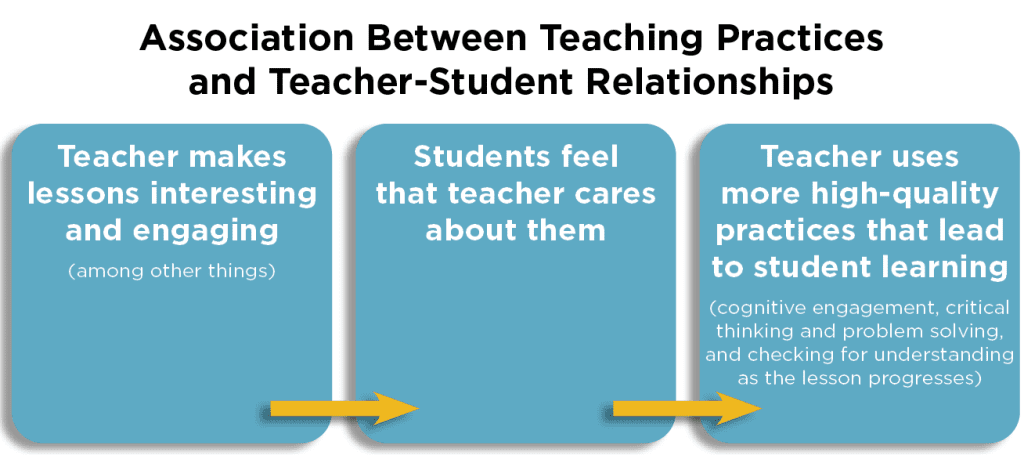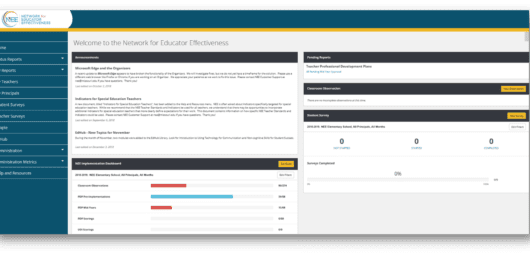Positive Teacher-Student Relationships May Lead to Better Teaching
Date Published: 11 February 2022
Li, X., Bergin, C., and Olsen, A. (2022). Positive teacher-student relationships may led to better teaching. Learning and Instruction. https://doi.org/10.1016/j.learninstruc.2022.101581.
Source“Our results suggest that when teacher-student relationships are positive, teachers are more likely to engage in complex, high-impact teaching practices that are associated with increased student learning. Our results suggest that when schools aim to improve the quality of teaching practices, they would do well to attend to improving the quality of teacher-student relationships first. One way to improve teaching-student relationships may be to use teaching strategies that affectively engage students in the content. Effects are likely to occur for all students but may be strongest for secondary students.” (Li, Bergin, & Olsen, 2022)
Purpose of the Study
To investigate the relationship between positive teacher-student relationships and high-quality teaching practices. The study sought to answer three questions:
- Do positive teacher-student relationships promote high-quality teaching practices?
- Does the effect vary by teaching practice?
- Does the effect vary by grade level?
Background of the Study
There is ample evidence available that shows the connection between positive teacher-student relationships and greater student motivation and achievement. Benefits of positive teacher-student relationships include higher grade point averages and standardized test scores, and a modest linkage to student achievement and student engagement.
Yet most of the research around teacher-student relationships focuses on the student side of the teacher-student relationship. This study seeks to examine the relationship between teaching quality and teacher-student relationships.
The Research
This study was completed by an innovative causal model selection method, direction dependence analysis (DDA), specifically conditionally direction dependence analysis.
The data used in the study comes from archival data within the Network for Educator Effectiveness database. Specifically, it includes data from school districts with student surveys completed in 2017-2018 and 2018-2019 on NEE indicators including 1.2, 4.1, 5.1, 5.3b, and 7.4.
This type of research minimizes theoretical assumptions and requires a large sample size to achieve desirable statistical power.
Findings
Three main findings emerged from the analysis:
- Positive teacher-student relationships promote complex teaching practices.
This study finds that when students perceive teacher-student relationships to be positive, those perceptions encourage teachers to implement complex teaching practices more frequently in the classroom. - Teacher-student relationships more strongly affect teaching in higher grade levels.
Students in higher grade levels indicated more frequently that teachers used cognitive engagement, critical thinking strategies, and instructional monitoring strategies. This could be because of increased complexity in secondary coursework that a teacher may incorporate, or it could be because of the mental growth and processing that comes with adolescence and maturity. - Affectively engaging students may result in positive teacher-student relationships.
In contrast to other teaching practices, the use of affective engagement (NEE 5.1) in the classroom was more likely to lead to positive teacher-student relationships in the classroom. Prior research found that students could differentiate between positive teacher-student relationships and motivational engagement. This study finds that the motivational practices a teacher uses to entice students into the classroom environment promote more positive teacher-student relationships, opposite of the hypothesis that positive teacher-student relationships would lead to higher ratings for affective engagement.
Reflection
Affective engagement, cognitive engagement, critical thinking, and instructional monitoring strategies are all some of the most common practices schools want teachers to include in everyday teaching, and all involve nuance and complexity. To help foster the use of those complex teaching practices, teacher-student relationships should be nurtured and encouraged. Taking the time to build relationships is good for students, but it also influences teachers. It may be that it gives teachers more security, more vulnerability to try new things, or the chance to go deeper in instruction. Whatever it is, a positive connection and relationship with students benefits teaching practices.
One of the best ways to build positive teacher-student relationships is for the teacher to provide opportunities for students to become motivated to be in the class. Motivational engagement is different from cognitive engagement. It’s not necessarily about being mentally involved or being active in learning. It’s more about feeling a connection to the classroom; students want to be wrapped into the classroom environment.
While there are numerous ways to provide affective engagement in the classroom, one of the best strategies is for the teacher to bring their own interests, authenticity, and personality into the classroom. When teachers incorporate their own character strengths and interests into the daily environment, it will encourage positive teacher-student relationships. Those relationships then should provide the opportunity and support from students to engage in more complex academic teaching practices to further encourage learning.
During NEE’s summer training series in 2022, one of the on-demand recertification options will focus on teacher character strengths and how to involve those strengths in the evaluation process to encourage authenticity and engagement in teaching. Building or district leaders will complete NEE Recertification training may register at www.neeadvantage.com/events.



